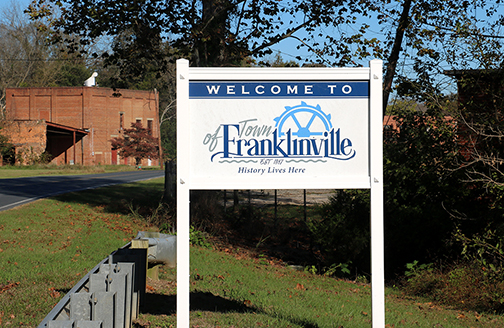Our Town

Franklinville History is Its Future
Franklinville has been a manufacturing community since its earliest beginnings in the 1760s. The mechanical power of Deep River as it flows through Town triggered the construction of numerous mills and still turns electric generators today. The first cotton factory was started in 1838, triggering the growth of a village where mill workers and their families could live, play, shop and worship.
In 1847 the state legislature incorporated the village as a Town, the first mill village government in the state. It was named after former Governor Jesse Franklin of Surry County, a well-known anti-slavery advocate. All of the original stockholders of the mill appear to have been Quakers or abolitionists, and the majority of the inhabitants were Unionists who voted against joining the Confederacy. Under military supervision during the Civil War, the mills made cotton underwear for soldiers. Outside of the mills Franklinville was a center of the Red String, the pro-Union Peace Party, which after 1865 was reborn as the new Republican Party.
Many of the most prominent leaders of the New South Cotton Mill Campaign were trained in Franklinville, and the influence of its Agent George Makepeace was widely acknowledged. A new generation assumed ownership of the mill in 1923, forming Randolph Mills, Inc., to own cotton mills, roller flour mills, printworks, peanut processors, and other businesses all over North Carolina. Facing major changes in its core cotton textile operations in the 1970s and 80s, that company was liquidated in bankruptcy. Randolph Industries, a bespoke fabric cushion manufacturer, was created out of the ruins, and is now the Town’s major employer.
Today the parks and open spaces created by the mill company over a hundred years ago are maintained by the Town and the vanished railroad has become the Deep River Rail-Trail, not only a hiking and biking greenway but a proposed kayak and canoe blueway. A new commercial business and industrial district is being created on US 64, while the historic heart of the village is a district listed on the National Register of Historic Places that seeks revitalization through cultural heritage tourism. Modern Franklinville not only seeks to preserve its historic character, but to use it to make our community a unique and hospitable place to live and work.

0 Comments